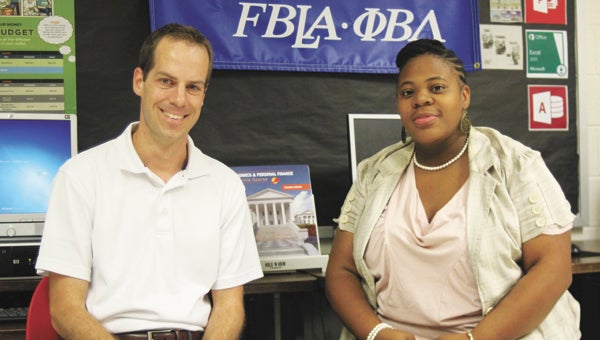Money on the mind
Published 10:58 pm Tuesday, October 28, 2014

Jason Bartholomew and Jessica Smith, who teach economics and personal finance at Nansemond River High School, were recently recognized as W!SE 2013-2014 Gold Star teachers.
Two Nansemond River High School economics and personal finance teachers recently honored for strong results in the classroom have stressed the importance of teaching financial literacy.
Jason Bartholomew and Jessica Smith were recognized as W!SE 2013-2014 Gold Star Teachers, after at least one of their respective classes achieved a 90 percent pass rate in the fall 2013 or spring 2014 W!SE Financial Literacy Certification Test.
Bartholomew is in just his second year of teaching after a long Navy career. “On average, I would say they don’t come with much,” he said of his students’ knowledge of financial matters.
Most of his students, he said, are juniors, and many of them have yet to experience that first job.
“They haven’t had the experience of earning an income, paying their own way, dealing with tax forms,” Bartholomew said. “Their experience is pretty shallow, unless they come from a home that really exposes them to it.”
Smith, in her sixth year of teaching at Nansemond River, said while most students haven’t had a job yet, “they know what a bank account is. They know they probably should be saving money.”
Insurance and taxes — “They are aware those things exist,” Smith said.
Bartholomew explained some of the concepts they teach, including income and the taxes removed from it that result in net pay.
“How do you spend it? How do you budget it properly?” he continued. “Do you give any of it away to charity? We also warn them about the bad things you can spend it on, like gambling.”
Students, he said, are also introduced to banking and financial products, credit and loans, different types of insurance and investing.
“We get into a little bit of microeconomics — supply and demand — and macroeconomics: fiscal policy at the government level,” he said.
Whether students learn about such things at school can play a large role in whether they’re financial failures or success stories later in life, according to Smith.
“This is knowledge that every person needs to have,” she said. “It’s not always taught at home, or the way your parents manage money might not be how you want to.”
Across Virginia, this year’s senior class is the first requiring a financial literacy course to graduate, Bartholomew noted.
Teaching the subject has its rewards: Bartholomew told of a student one day approaching him in the cafeteria to ask for help in completing a Form W-4 after getting her first job.
“They’re not going to walk out experts, but at least if they walk out with the confidence to ask for advice, I think we have won most of the battle,” he said.





